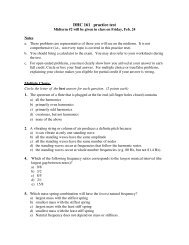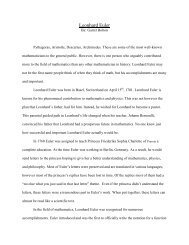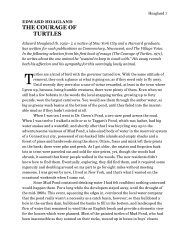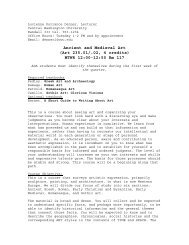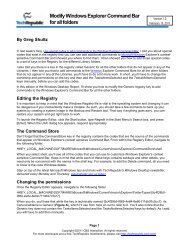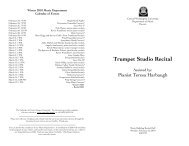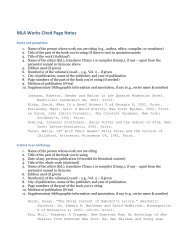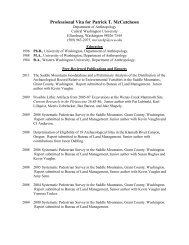The Ingenious Gentleman Don Quixote de la Mancha
The Ingenious Gentleman Don Quixote de la Mancha
The Ingenious Gentleman Don Quixote de la Mancha
You also want an ePaper? Increase the reach of your titles
YUMPU automatically turns print PDFs into web optimized ePapers that Google loves.
<strong>Don</strong> <strong>Quixote</strong> <strong>de</strong> <strong>la</strong> <strong>Mancha</strong> 223 <br />
<br />
very often. <strong>The</strong> house was all in confusion; but still the niece ate and the <br />
housekeeper drank and Sancho Panza enjoyed himself; for inheriting property <br />
wipes out or softens down in the heir the feeling of grief the <strong>de</strong>ad man might be <br />
expected to leave behind him. <br />
<br />
At <strong>la</strong>st <strong>Don</strong> <strong>Quixote</strong>'s end came, after he had received all the sacraments, and had in <br />
full and forcible terms expressed his <strong>de</strong>testation of books of chivalry. <strong>The</strong> notary <br />
was there at the time, and he said that in no book of chivalry had he ever read of any <br />
knight‐errant dying in his bed so calmly and so like a Christian as <strong>Don</strong> <strong>Quixote</strong>, who <br />
amid the tears and <strong>la</strong>mentations of all present yiel<strong>de</strong>d up his spirit. On perceiving it, <br />
the curate begged the notary to bear witness that Alonso Quixano the Good, <br />
commonly called <strong>Don</strong> <strong>Quixote</strong> of La <strong>Mancha</strong>, had passed away from this present life, <br />
and died naturally; and said he <strong>de</strong>sired this testimony in or<strong>de</strong>r to remove the <br />
possibility of any other author save Ci<strong>de</strong> Hamete Benengeli bringing him to life <br />
again falsely and making interminable stories out of his achievements. 60 <br />
<br />
Such was the end of the <strong>Ingenious</strong> <strong>Gentleman</strong> of La <strong>Mancha</strong>, whose vil<strong>la</strong>ge Ci<strong>de</strong> <br />
Hamete would not indicate precisely, in or<strong>de</strong>r to leave all the towns and vil<strong>la</strong>ges of <br />
La <strong>Mancha</strong> to contend among themselves for the right to adopt him and c<strong>la</strong>im him as <br />
a son, as the seven cities of Greece conten<strong>de</strong>d for Homer. <strong>The</strong> <strong>la</strong>mentations of <br />
Sancho and the niece and housekeeper are omitted here, as well as the new epitaphs <br />
upon his tomb; Sanson Carrasco, however, put down the following lines: <br />
<br />
A doughty gentleman lies here; <br />
A stranger all his life to fear; <br />
Nor in his <strong>de</strong>ath could Death prevail, <br />
In that <strong>la</strong>st hour, to make him quail. <br />
He for the world but little cared; <br />
And at his feats the world was scared; <br />
<br />
60 It is commonly believed that Cervantes killed off his hero in or<strong>de</strong>r to prevent any <br />
more false sequels like the one that had obliged him to write Part Two.






